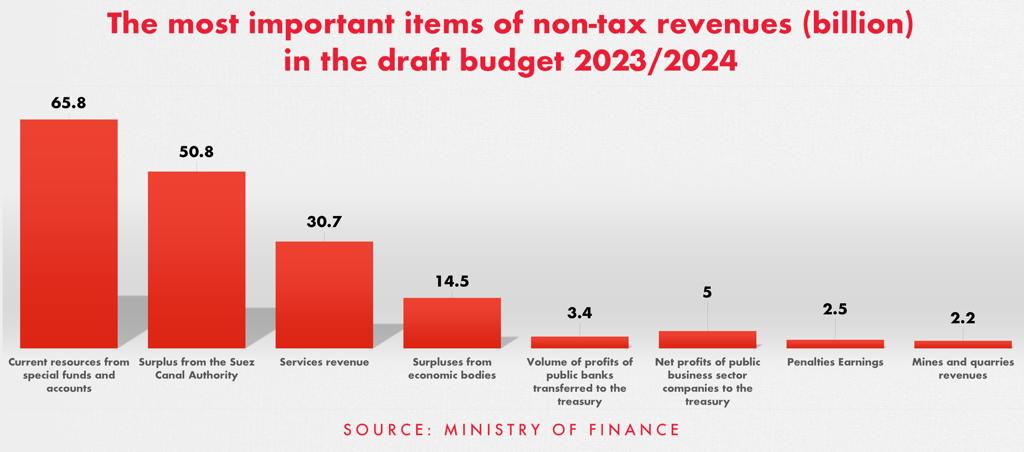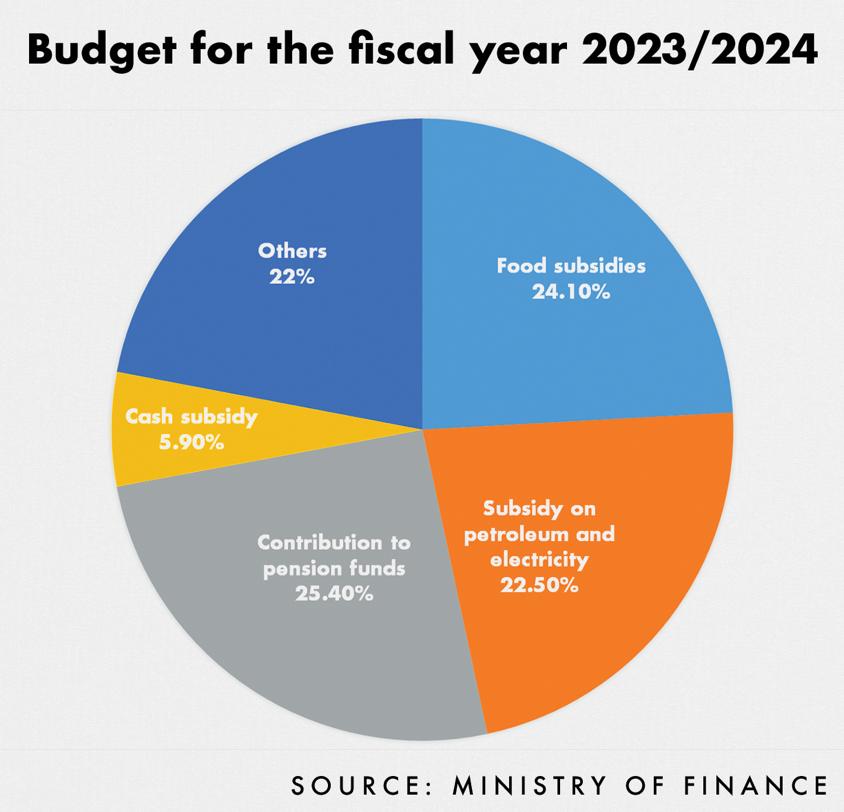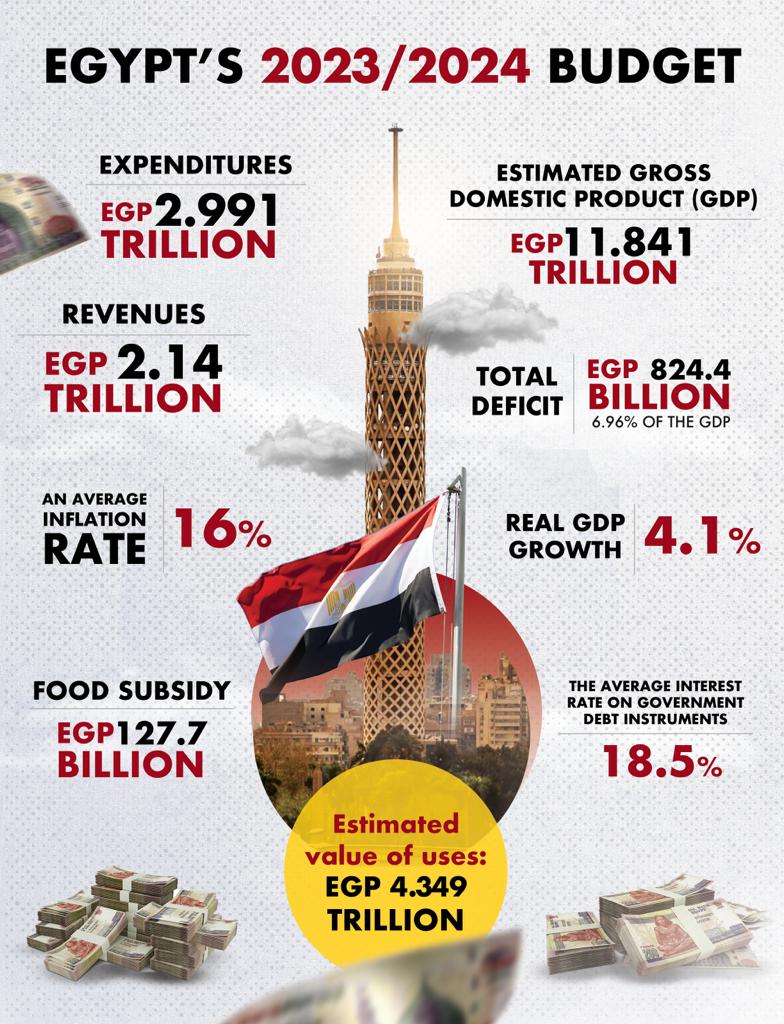CAIRO: The Egyptian Parliament finally approved in June the draft state general budget and the social and economic development plan for the fiscal year 2023/24.
The estimated value of uses in the fiscal year 2023/2024 budget is about LE 4.349 trillion, while the estimated gross domestic product (GDP) amounted to about LE 11.841 trillion.
The estimated value of expenditures is about LE 2.991 trillion distributed over eight items in the budget; the allocations for chapter 1 includes wages, which captures allocations estimated at about LE 470 billion; the purchase of goods and services, whose total financial allocations amount to about LE 139 billion; the interests of the public debt, whose allocations in the budget amount to about LE 1.120 trillion of the total expenditures; and allocations for subsidies, grants, and social benefits that amount to about LE 529 billion. And the data indicates that the total government investment allocations amounted to about LE 586.690 billion.
The provision of Chapter 7 to acquire assets and financing imbalances for some economic bodies and public companies amounted to LE 42.376 billion. Meanwhile, the allocation for Chapter 8, which deals with the payment of installments of domestic and foreign loans, amounted to about LE 1.316 trillion. The value of taxes, grants, and other non-tax revenues for the fiscal year 2023/2024 amounted to LE 2.142 trillion.
The draft budget expects spending of LE 2.99 trillion and revenues of LE 2.14 trillion. The total deficit is expected to reach LE 824.4 billion, or 6.96 percent of the GDP, down from 8 percent expected during the fiscal year of 2022/2023.
The budget, passed by Parliament in June, projects real GDP growth of 4.1 percent and an average inflation rate of 16 percent. It also estimates that the average interest rate on government debt instruments is 18.5 percent.
The fiscal year in Egypt begins in July of each year and ends at the end of June of the following year.
According to the budget’s figures, government spending is set to increase by 34 percent on an annual basis in the fiscal year 2023/24, while debt service represents the largest single item of total spending.
In the context of countering inflation, the government also aims to increase spending on social protection and support programs, as well as on wages, commodity purchases, social support, public investment, education, and health.
Answering claims about violating the constitution regarding financial allocations for the health and education sectors, Minister of Finance Mohamed Maait denied these claims, pointing to the allocation of LE 591.9 billion for education in the new budget, and LE 99.9 billion for scientific research.
The Egyptian constitution, in Articles 19 and 21, requires the government to allocate 6 percent of the gross domestic product for spending on education (4 percent for pre-university education, and 2 percent for university education), provided that this percentage gradually rises until it is in line with international rates. He explained that allocations for the health sector were increased by LE 13.3 billion to reach LE 111.2 billion, with a growth rate of 14 percent.
The Egyptian constitution, in Article 18, requires the government to allocate 3 percent of the gross national product for spending on health, provided that this percentage gradually rises until it is in line with international rates.
Maait defended the budget before the deputies at the end of the debate sessions, pointing to the “extraordinary” global economic challenges that resulted from the high inflation and high interest rate environment in the aftermath of the Russian-Ukrainian war.
He said that interest rates on government borrowing have more than doubled to about 24 percent. He added, “We expect inflation and interest rates to decline at the end of this year,” stressing that the government will do its best to compensate society for this negative impact.
The minister pointed out that the executive regulations of the unified public finance law will be issued within weeks, after being reviewed by the International Monetary Fund (IMF) and other bodies.
The unified public finance law is a legislative development, merging the “General Budget Law
(Law No. 53 of 1973 regarding the State’s General Budget)” and Law No. 127 of 1981 on government accounting.
Food Subsidy
According to the budget, Egypt will allocate LE 127.7 billion ($4.14 billion) to the food subsidy program. With a population of 105 million, Egypt is one of the world’s largest importers of wheat and is also dependent on imports of other staple foods and fuel.
A financial statement attached to the draft budget approved by Parliament stated that the Ministry of Finance estimated Egypt’s need for 8.25 million tons of wheat in the next fiscal year, and that the budget is based on an oil price of $80 per barrel of Brent Crude.
In March, the Egyptian government announced that it would raise food subsidies by 20 percent, and subsidies for petroleum products by 24 percent, in the draft budget for the fiscal year 2023-2024.
Data from the Central Bank of Egypt recently showed an increase in the annual core inflation rate in Egypt to 40.3 percent, in May from 38.6 percent in April.
The data also showed that the basic consumer price index recorded a monthly rate of 2.9 percent in May 2023, compared to a monthly rate of 1.6 percent in the same month of the previous year, and a monthly rate of 1.7 percent in April 2023.
The law, which was ratified in 2022, requires the government to submit an annual and medium-term financial strategy to Parliament, and sets spending limits for each ministry. Maait clarified that a ministerial committee is also working to support many losing government agencies, including the National Authority for Egyptian Railways, the National Media Authority, and the National Authority for Tunnels, in order to turn them into profits.
MPs comments
A number of parliament members described the state’s general budget for the new fiscal year 2023/2024 as an exceptional and preventive budget.
This came during the plenary session of the House of Representatives, to discuss the Planning and Budget Committee’s report on the draft economic and social development plan for the fiscal year 2023/2024, the draft general state budget, the draft budgets of public economic bodies, and the National Authority for Military Production for the fiscal year 2023 / 2024.
Representative Mohamed Kamal Marei, head of the Small and Medium Enterprises Committee at the House of Representatives, said that according to the Small and Medium Enterprises Development Law, LE 1.5 billion are required for projects. He called on the minister of finance to grant this amount of support and incentives to the projects, and demanded a subsidy for industry and agriculture, as well as creating an environment for its development, and providing incentives for medium and small projects.
Meanwhile, Representative Hassan al-Meer said that this budget comes in line with the
crushing economic conditions the world is witnessing. The simplest thing to say about it is that it is an exceptional preventive budget to implement public spending priorities.
Furthermore, Representative Hossam Awad Allah, chairman of the Energy and Environment Committee, said that the economic conditions the world has been going through since the COVID-19 pandemic and the Russian-Ukrainian war affected the economies of countries, including Egypt, reflected on the state’s general budget.
“We must encourage investment in new and renewable energy, establish projects to save foreign currency, expand environmental projects, and encourage local and foreign investment,” he added.
In his speech, Representative Ali Badr said: “This budget comes in very difficult circumstances. The plan must prioritize completing projects that serve the citizens. There are projects in villages with an implementation rate of 80 percent, yet there is a delay.”
Representative Ayman Mehasseb said that there must be a way out of the crisis, and that we must adopt projects and investments that generate returns, and reduce non-productive projects.
He commended the fact that the budget has preserved constitutional entitlements, stressing that there must be coordination between the Ministry of Planning and the Ministry of Finance regarding balancing programs and performance.



Comments
Leave a Comment